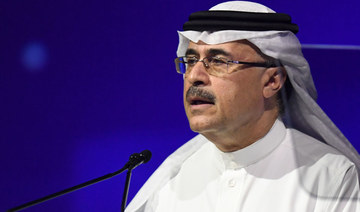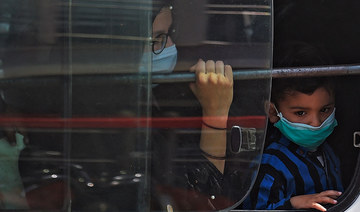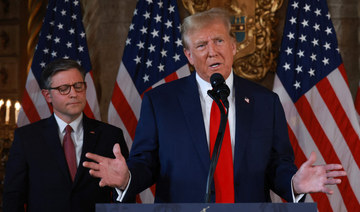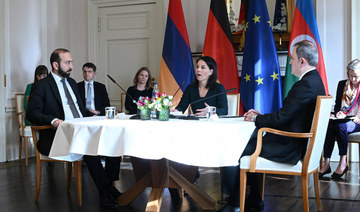BRUSSELS: The World Health Organization (WHO) says the global risk from the omicron variant of the coronavirus is “very high” based on early evidence, and it could lead to surges with “severe consequences.”
The UN health agency, in a technical memo to member states, says “considerable uncertainties” remain about the new variant that was first detected in southern Africa. But it says the likelihood of possible further spread around the world is high.
Taking an act-now-ask-questions-later approach, countries around the world slammed their doors shut again to try to keep the new omicron variant at bay Monday as more cases of the mutant coronavirus emerged and scientists raced to figure out just how dangerous it might be.
Japan announced it would bar entry of all foreign visitors, joining Israel in doing so just days after the variant was identified by researchers in South Africa. Morocco banned all incoming flights. Other countries, including the US and European Union members, have moved to prohibit travelers arriving from southern Africa.
Travelers infected with the new version have turned up in a widening circle of countries over the past few days, including now Spain, and cases in Portugal and Scotland have raised fears that the variant may already be spreading locally.
“Many of us might think we are done with COVID-19. It’s not done with us,” warned Tedros Adhanom Ghebreyesus, WHO’s director-general.
Days after the variant sent a shudder through the financial world nearly two years into the pandemic that has killed over 5 million people, markets had mixed reactions Monday, with European stocks and oil prices rebounding and Wall Street opening higher, while Asian markets fell further.
US President Joe Biden called the omicron variant a cause for concern but “not a cause for panic.” He said he is not considering any widespread US lockdown and instead urged vaccinations and mask-wearing.
The infections have underscored the difficulty in keeping the virus in check in a globalized world of jet travel and open borders. Yet, many countries are trying to do just that, against the urging of the WHO, which noted that border closings often have limited effect and can wreak havoc on lives and livelihoods.
Some argued that such restrictions could provide valuable time to analyze the new variant. Little is known about it, including whether it is more contagious, more likely to cause serious illness or more able to evade vaccines.
While the initial global response to COVID-19 was criticized as slow and haphazard, the reaction to the new variant came quickly.
“This time the world showed it is learning,” said EU Commission President Ursula von der Leyen, singling out South African President Cyril Ramaphosa for praise. “South Africa’s analytic work and transparency and sharing its results was indispensable in allowing a swift global response. It no doubt saved many lives.”
Late last week, von der Leyen successfully pushed the 27-nation EU to agree to ban flights from seven southern African nations, similar to what many other countries are doing.
Cases had already been reported in EU nations Belgium, Denmark and the Netherlands before Portuguese authorities identified 13 omicron infections among members of the Belenenses professional soccer team. Authorities reported one member had recently traveled to South Africa. A game over the weekend had been abandoned at halftime for lack of players.
Spain also reported its first confirmed case of the variant.
And after Scotland reported its first six cases, First Minister Nicola Sturgeon warned that “there might already be some community transmission of this variant.”
Taking no chances, Japan, which has yet to detect any omicron cases, reimposed border controls that it had eased earlier this month.
Israel likewise decided to bar entry to foreigners, and Morocco said it would suspend all incoming flights for two weeks starting Monday.
The UK has reported about a dozen omicron cases.
Despite the global worry, scientists cautioned that it is still unclear whether omicron is more alarming than other versions.
So far, doctors in South Africa are reporting patients are suffering mostly mild symptoms, but they warn that it is still early. Also, most of the new cases are in people in their 20s and 30s, who generally do not get as sick from COVID-19 as older patients.
“We’ve seen a sharp increase in cases for the past 10 days. So far they have mostly been very mild cases, with patients having flu-like symptoms: dry coughs, fever, night sweats, a lot of body pains,” said Dr. Unben Pillay, a general practitioner in Gauteng province, where 81 percent of the new cases have been reported.
The variant has provided further proof of what experts have long been saying: that no continent will be safe until the whole globe has been sufficiently vaccinated. The more the virus is allowed to spread, the more opportunities it has to mutate.
“The emergence of the omicron variant has fulfilled, in a precise way, the predictions of the scientists who warned that the elevated transmission of the virus in areas with limited access to vaccine would speed its evolution,” said Dr. Richard Hatchett, head of CEPI, one of the founders of the UN-backed global vaccine sharing initiative COVAX.
In some parts of the world, authorities are moving in the opposite direction.
In Malaysia, officials went ahead with the partial reopening of a bridge connecting it to Singapore. And New Zealand announced it will press ahead with plans to reopen internally after months of shutdown, though it is also restricting travel from nine southern African nations.
WHO warns that new coronavirus variant poses ‘very high’ risk
https://arab.news/9zdx4
WHO warns that new coronavirus variant poses ‘very high’ risk
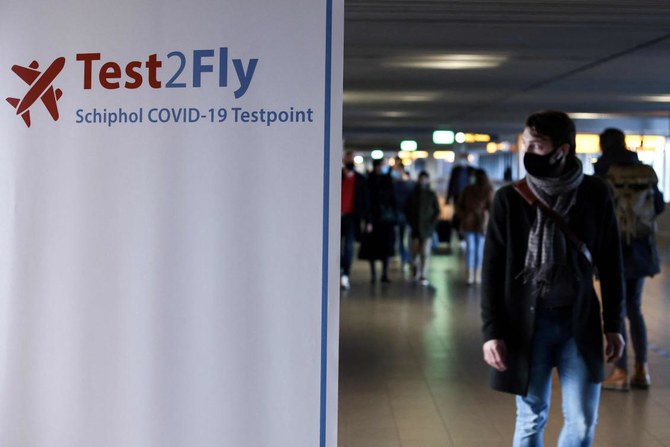
- The UN health agency says ‘considerable uncertainties’ remain about the new variant that was first detected in southern Africa
- ‘Many of us might think we are done with COVID-19. It’s not done with us’
US House quickly defeats Republican hardliners’ effort to oust Speaker Johnson
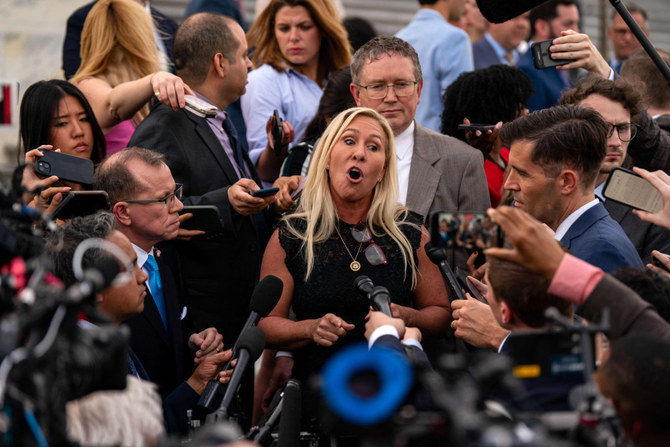
- Democrats joined Republicans in a 359-43 vote to protect Johnson’s speakership to avoid a replay of the chaos that occurred in October
- Hakeem Jeffries, the House's Democratic Party leader, said he hoped to see House Republicans turn against party hard-liners
WASHINGTON: The US House of Representatives on Wednesday swiftly and overwhelmingly defeated an effort by firebrand Republican Marjorie Taylor Greene to remove Speaker Mike Johnson, a fellow Republican, from his leadership role.
Democrats joined Republicans in a 359-43 vote to protect Johnson’s speakership, in a bid to avoid a replay of the chaos that occurred in October when Republicans ousted his predecessor, Kevin McCarthy.
Greene’s move represented a rare Republican defiance of presidential candidate Donald Trump, who in a social media post following the House vote on Wednesday, said it was “not the time” for Republicans to try to push out their own speaker.
Greene’s measure, known as a motion to vacate, showcased the disorder that has marked Republicans’ slim 217-213 House majority, particularly since it had been clear that the effort would fail given Democrats’ opposition.
“I appreciate the show of confidence from my colleagues to defeat this misguided effort,” Johnson, 52, said following the vote. “Hopefully this is the end of the character assassination that has characterized the current Congress.”

Multiple Republicans criticized Greene’s move, including centrist Representative Marc Molinaro.
“This is not an individual who knows how to lead,” Molinaro said of Greene. “She’s not an individual who knows how to negotiate. And she certainly doesn’t seem to have any concern for the stability of the Congress or the people we represent.”
Greene stood flanked by fellow Republican Thomas Massie when she made her move against Johnson, criticizing him for a string of compromises with Democrats, who hold a majority in the Senate.
“Excuses like ‘this is just how you have to govern in divided government’ are pathetic, weak and unacceptable,” Greene said of Johnson. “Even with our razor-thin Republican majority we could have at least secured the border.”
Taunts and jeers
The chamber erupted in taunts and cheers at points as Greene read her resolution, with Democrats at times chanting “Hakeem, Hakeem,” a reference to their party leader, Hakeem Jeffries, in an echo of the many times they voted for him as speaker during Republicans’ multiple rounds of voting for speaker since the current House was seated in January 2021.
Johnson has angered many hard-liners by enacting bipartisan spending measures to avoid government shutdowns and aid US allies including Ukraine, without insisting on strict security measures for the US-Mexico border that Democrats reject.
The House Republicans’ border security bill had no chance of passing the Democratic-controlled Senate.

A bipartisan compromise bill negotiated late last year and early this year in the Senate, with the Biden administration’s approval, was killed by House and Senate Republicans at Trump’s behest.
Johnson could be seen walking around the House floor after Greene began her call on Wednesday for his ouster, with Republican supporters shaking his hand and patting him on the back.
“Republicans have to be fighting the Radical Left Democrats, and all the Damage they have done to our Country,” Trump said in his Wednesday post. “We’re not in a position of voting on a Motion to Vacate. At some point, we may very well be, but this is not the time.”
The situation has bolstered Jeffries, who agreed to save Johnson from ouster after freeing Congress from the road block of Republican infighting by delivering crucial Democratic support for must-pass bills.
Greene in remarks to reporters after the vote did not rule out trying to oust Johnson again.
For his part, Jeffries said he hoped to see House Republicans turn against party hard-liners, saying, “The only thing we ask of our House Republican colleagues is for traditional Republicans to further isolate the extreme MAGA Republican wing of the GOP, which has visited nothing but chaos and dysfunction on the American people.”
Britain and NATO allies must spend more, be tougher, UK’s Cameron to say
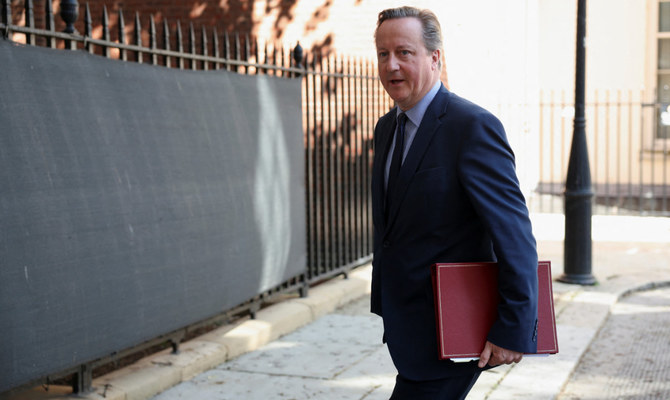
- The upcoming NATO summit must see all allies on track to deliver their pledge made in Wales in 2014 to spend 2 percent on defense
LONDON: Britain’s foreign minister, David Cameron, will urge its fellow NATO members to meet their pledge to spend 2 percent of GDP on defense, and to be tougher and more assertive with adversaries, in a speech to be delivered on Thursday.
In what is billed as his first major pronouncement as foreign secretary, Cameron will say NATO must “out-compete, out-cooperate and out-innovate,” and that Britain must not only bolster existing alliances but also forge new partnerships around the globe.
“We are in a battle of wills. We all must prove our adversaries wrong – Britain, and our allies and partners around the world,” Cameron will say at the UK’s National Cyber Security Center, according to extracts released by his office.
“The upcoming NATO summit must see all allies on track to deliver their pledge made in Wales in 2014 to spend 2 percent on defense. And we then need to move quickly to establish 2.5 percent as the new benchmark for all NATO allies.” Last month, Prime Minister Rishi Sunak said British defense spending would increase to 2.5 percent of GDP by 2030 — an additional 75 billion pounds ($94 billion) over the next six years.
Britain has been one of the most vocal and active backers of Ukraine in the wake of the invasion by Russia, and Cameron, a former prime minister, will say too nations are not learning the lessons of that conflict.
Some in Europe seem unwilling to spend on defense while war rages nearby, Cameron will say, adding that while some nations have criticized attacks on shipping in the Red Sea, only Britain and the United States have carried out strikes in retaliation.
“If (Russian President Vladimir) Putin’s illegal invasion teaches us anything, it must be that doing too little, too late only spurs an aggressor on,” he will say. .”.. This cannot go on. We need to be tougher and more assertive.”
Russia’s biggest airstrike in weeks piles pressure on Ukraine power grid
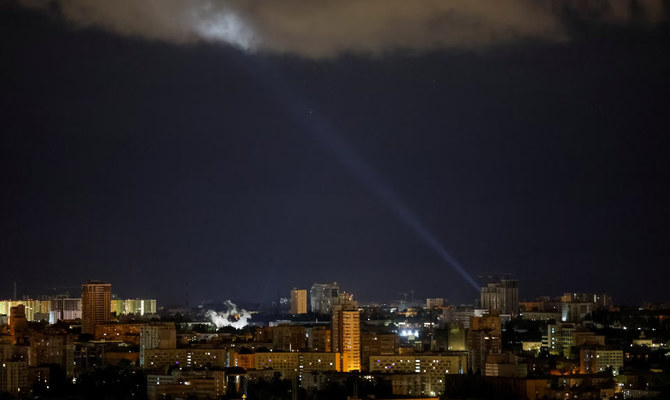
- Russia’s defense ministry said it struck Ukraine’s military-industrial complex and energy facilities in retaliation for Kyiv’s strikes on Russian energy facilities
KYIV: Russian missiles and drones struck nearly a dozen Ukrainian energy infrastructure facilities on Wednesday, causing serious damage at three Soviet-era thermal power plants and blackouts in multiple regions, officials said.
Ukraine’s air force said it shot down 39 of 55 missiles and 20 of 21 attack drones used for the attack, which piles more pressure on the energy system more than two years after Russia launched its full-scale invasion.
“Another massive attack on our energy industry!” Energy Minister German Galushchenko wrote on the Telegram app.
Two people were injured in the Kyiv region and one was hurt in the Kirovohrad region, Interior Minister Ihor Klymenko said.
Galushchenko said power generation and transmission facilities in the Poltava, Kirovohrad, Zaporizhzhia, Lviv, Ivano-Frankivsk and Vinnytsia regions were targeted.
Some 350 rescuers raced to minimize the damage to energy facilities, 30 homes, public transport vehicles, cars, and a fire station, the interior ministry said.
National power grid operator Ukrenergo said it was forced to introduce electricity cuts in nine regions for consumers and that it would expand them nationwide for businesses during peak evening hours until 11 p.m. (2000 GMT).
Ukrenergo CEO Volodymyr Kudrytskyi, interviewed by the Ukrainska Pravda media outlet, said electricity imports would not make up for power shortages. He said hydropower stations had also been hit, clarifying an earlier company statement omitting hydro stations from the list of affected facilities.
Power cuts for industrial users, he said, were “almost guaranteed” but interruptions for domestic users would depend on how well they reduced consumption.
“Many important power stations were damaged,” he said, citing three stations operated by DTEK, Ukraine’s biggest private company, as well as two hydropower stations.
“The damage is on quite a large scale. There is a significant loss of generating power, so significant that even imports of power from Europe will not cover the shortage that has been created in the energy system.”
Russia’s defense ministry said it struck Ukraine’s military-industrial complex and energy facilities in retaliation for Kyiv’s strikes on Russian energy facilities.
“As a result of the strike, Ukraine’s capabilities for the output of military products, as well as the transfer of Western weapons and military equipment to the line of contact, have been significantly reduced,” the ministry said.
WORLD WAR TWO ANNIVERSARY
President Volodymyr Zelensky noted the attacks were launched on the day Ukraine marks the end of World War Two.
“This is how the Kremlin marks the end of World War Two in Europe, with a massive strike, attempting to disrupt the lives of our people with its Nazism,” he said in his nightly video address.
In an earlier online address, Zelensky singled out what he said was the West’s limited progress in curbing Russian energy revenue and some countries that attended President Vladimir Putin’s inauguration for a fifth term in the Kremlin on Tuesday.
Fighting Nazism back then, he said, was “when humanity unites, opposes Hitler, instead of buying his oil and coming to his inauguration.”
Ukraine has stepped up drone attacks on Russian refineries this year despite apparent objections by the United States, trying to find a pressure point against the Kremlin whose forces are slowly advancing in the eastern Donbas region.
Ukrainian strikes on Russian refineries may have disrupted more than 15 percent of Russian oil refining capacity, a NATO military alliance official has said.
After pounding the energy system in the first winter of the war, Russia renewed its assault on the grid in March as Ukraine was running low on stocks of Western air defense missiles.
Prime Minister Denys Shmyhal estimated that more than 800 heating facilities had been damaged and up to 8 GW of power generation lost so far, adding the government needed $1 billion to fund repair work.
DTEK vowed to keep working to restore power at its facilities, and its CEO, Maxim Timchenko, called on Ukraine’s allies to provide more air defense systems.
Officials did not name the facilities hit on Wednesday, part of a policy of wartime secrecy that Kyiv says is needed to prevent Russia using the information for further strikes.
But Lviv governor Maksym Kozytskyi said Russia attacked a natural gas storage facility in his region in the west of the country, Radio Free Europe/Radio Liberty reported.
In central Poltava region, energy infrastructure was hit by a drone, Poltava Regional Governor Filip Pronin said.
The governors of Vinnytsia and Zaporizhzhia said critical civilian infrastructure facilities were damaged.
Armenia’s prime minister in Russia for talks amid strain in ties
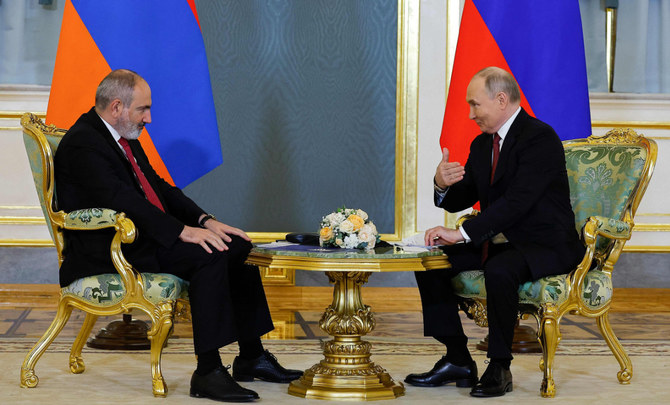
- Putin hosted Nikol Pashinyan for talks following a summit of the Eurasian Economic Union, a Moscow-dominated economic alliance
- Armenia’s ties with its longtime sponsor and ally Russia have grown increasingly strained after Azerbaijan waged a lightning military campaign in September to reclaim the Karabakh region
MOSCOW: Armenia’s prime minister visited Moscow and held talks Wednesday with Russian President Vladimir Putin amid spiraling tensions between the estranged allies.
Putin hosted Nikol Pashinyan for talks following a summit of the Eurasian Economic Union, a Moscow-dominated economic alliance. that they both attended earlier in the day. The negotiations came a day after Putin began his fifth term at a glittering Kremlin inauguration.
In brief remarks at the start of the talks, Putin said that bilateral trade was growing, but acknowledged “some issues concerning security in the region.”
Pashinyan, who last visited Moscow in December, said that “certain issues have piled up since then.”
Armenia’s ties with its longtime sponsor and ally Russia have grown increasingly strained after Azerbaijan waged a lightning military campaign in September to reclaim the Karabakh region, ending three decades of ethnic Armenian separatists’ rule there.
Armenian authorities accused Russian peacekeepers who were deployed to Nagorno-Karabakh after the previous round of hostilities in 2020 of failing to stop Azerbaijan’s onslaught. Moscow, which has a military base in Armenia, has rejected the accusations, arguing that its troops didn’t have a mandate to intervene.
The Kremlin, in turn, has been angered by Pashinyan’s efforts to deepen ties with the West and distance his country from Moscow-dominated security and economic alliances.
Just as Pashinyan was visiting Moscow on Wednesday, Armenia’s Foreign Ministry announced that the country will stop paying fees to the Collective Security Treaty Organization, a Russia-dominated security pact. Armenia has previously suspended its participation in the grouping as Pashinyan has sought to bolster ties with the European Union and NATO.
Russia was also vexed by Armenia’s decision to join the International Criminal Court, which last year indicted Putin for alleged war crimes connected to the Russian action in Ukraine.
Moscow, busy with the Ukrainian conflict that has dragged into a third year, has publicly voiced concern about Yerevan’s westward shift but sought to downplay the differences.
Kremlin spokesman Dmitry Peskov conceded Tuesday that “there are certain problems in our bilateral relations,” but added that “there is a political will to continue the dialogue.”
AstraZeneca to withdraw COVID vaccine globally as demand dips

- AstraZeneca says initiated worldwide withdrawal due to “surplus of available updated vaccines”
- Drugmaker has previously admitted vaccine causes side effects such as blood clots, low blood platelet counts
AstraZeneca said on Tuesday it had initiated the worldwide withdrawal of its COVID-19 vaccine due to a “surplus of available updated vaccines” since the pandemic.
The company also said it would proceed to withdraw the vaccine Vaxzevria’s marketing authorizations within Europe.
“As multiple, variant COVID-19 vaccines have since been developed there is a surplus of available updated vaccines,” the company said, adding that this had led to a decline in demand for Vaxzevria, which is no longer being manufactured or supplied.
According to media reports, the Anglo-Swedish drugmaker has previously admitted in court documents that the vaccine causes side-effects such as blood clots and low blood platelet counts.
The firm’s application to withdraw the vaccine was made on March 5 and came into effect on May 7, according to the Telegraph, which first reported the development.
The Serum Institute of India (SII), which produced AstraZeneca’s COVID-19 vaccine under the brand name Covishield, stopped manufacturing and supply of the doses since December 2021, an SII spokesperson said.
London-listed AstraZeneca began moving into respiratory syncytial virus vaccines and obesity drugs through several deals last year after a slowdown in growth as COVID-19 medicine sales declined.



